Govt will not introduce airport-specific EU visas post-Brexit, says aviation minister

In a bid to strengthen its UK workforce, the government will not introduce any specific visas for EU labourers to help airports with staffing levels.
Aviation minister Baroness Vere told journalists it was up to everyone working in the sector to establish a “sustainable and secure UK workforce that meets our needs, [and] that is diverse and skilled.”
The DfT has recently launched recruitment campaign called ‘Generation Aviation’ to boost aviation recruitment.
“Working with the sector, I think we can get through staffing challenges,” she added.
Post-Brexit labour rules have often been highlighted as one of the main issues affecting the UK travel and tourism sector, leading to issues such as this summer’s travel chaos.
Industry stakeholders such as Ryanair and Easyjet have repeatedly called on the UK Government to implement post-Brexit labour laws with a bit more common sense.
Ryanair’s boss Michael O’Leary said this summer that he could get visas for extra-EU workers easier than for EU nationals.
Nevertheless, the government has always maintained that Brexit didn’t play a part in disruption at airports.
“I’m sure many saw what happened to the aviation sector in Europe and in the US, as they also struggled significantly,” Baroness Vere commented.
“What happened at Schiphol was way worse than anything we saw in the UK.”
Vere’s comments come as Mark Tanzer, chief executive of trade body ABTA, called on ministers to consider extending the Youth Mobility Scheme to individual EU countries on a bilateral basis.
The Youth Mobility Scheme is a visa that allows young people from specific countries to live in the UK for up to two years.
As of now, only a handful of countries take part in the scheme – including Australia, New Zealand and India.
“This would be a pragmatic move, in the absence of our negotiating a wider mobility chapter within the UK-EU trade deal, which is not due to be opened until 2025,” Tanzer said.
According to Joss Croft, chief executive of tourism body UKInbound, labour shortages are not the only ones hindering the sector.
“A lot of my members need people who have those overseas languages and they’re really struggling to find them within the UK nowadays,” he said.
“These are European languages that UK nationals just aren’t doing at the moment.”
The government was approached for comment.